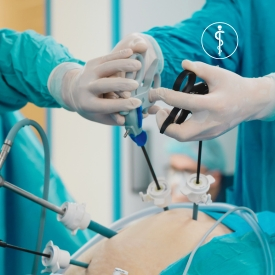Laparoscopic Surgery

Dr. Mohit Agrawal is a highly skilled Gastrointestinal and Laparoscopic Surgeon with over 8 years of dedicated experience specializing in advanced laparoscopic procedures practicing in Goregaon, Kandivali, Borivali, Malad, Mahim. His expertise focuses on gastrointestinal (GI) and colorectal surgeries, utilizing minimally invasive techniques that promote faster recovery and reduce patient discomfort. Dr. Agrawal is also renowned for his proficiency in laparoscopic hernia surgeries, ensuring precision and excellent outcomes for his patients. His commitment to excellence in surgical care has made him a trusted name in the field.
Laparoscopic surgery, often referred to as keyhole surgery, is an advanced method of performing surgery that allows the surgeon to access the abdomen and pelvis without the need for large incisions.
In traditional open surgery, a single large incision is made, but laparoscopic surgery involves several small incisions, typically measuring around 0.5-1 cm. A thin tool called a laparoscope, equipped with a tiny video camera and light, is inserted through one of these small incisions. This innovative approach provides the surgeon with enhanced visibility and precision during the procedure.
At the beginning of the surgery, the surgeon inflates the abdominal cavity with carbon dioxide gas to create a working and viewing space, which helps facilitate the operation.
Dr. Mohit Agrawal specializes in a wide range of laparoscopic surgeries, ensuring comprehensive care for his patients through advanced techniques. These include:
Dr. Agrawal’s expertise in these procedures ensures that patients receive the highest quality of care with the advantages of minimally invasive techniques, including less pain, quicker recovery, and minimal scarring.
Dr. Agrawal is a leading expert in laparoscopic surgery, bringing unparalleled skill and precision to every procedure. His expertise ensures successful outcomes, even in complex cases.
Every patient’s journey is unique. Dr. Agrawal takes the time to understand your needs, provide clear guidance, and develop a customized treatment plan tailored to your health goals.
Dr. Agrawal utilizes state-of-the-art equipment and the latest advancements in minimally invasive surgery to provide optimal results with minimal disruption to your daily life.
With a meticulous approach, Dr. Agrawal ensures minimal post-operative pain, shorter hospital stays, and faster recovery times, allowing patients to return to their routines with confidence.

MBBS, M.S. FMAS, FIAGES, FALS
With over 9 years of dedicated experience, Dr. Mohit Agrawal is a highly skilled surgeon known for Laparoscopic Surgery, focusing on advanced laparoscopic keyhole surgeries. Being Laparoscopic Surgery has a strong expertise in minimally invasive techniques, allowing for faster recovery and reduced patient discomfort. Dr. Agrawal, Laparoscopic Surgery with his advanced surgical techniques ensures effective treatment and excellent outcomes for his patients. His commitment to excellence in surgical care makes him a trusted name in the field of Laparoscopic Surgery.
Ready to take the next step towards expert and personalized care for Laparoscopic Surgery?
Contact us today to schedule your consultation. Our experienced Laparoscopic Surgery team is here to provide expert guidance and ensure your comfort throughout the process.